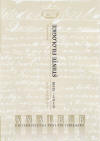EL HUMOR Y LA IRONÍA EN LA NOVELA TRANSMODERNA
Humour and Irony in the Transmodern Novel
Author(s): Sorina Dora Simion Subject(s): Literary Texts
Published by: Editura Universităţii de Vest din Timişoara
Keywords: transmodernity; Enrique Vila-Matas; rhetorical figures; general-rhetorical analysis; humor; irony
Summary/Abstract: In this study we approach the transmodern novel. We analyse and interpret some of its specific features, by using the complex general-rhetorical method conceived by Antonio García Berrio, Tomás Albaladejo and Francisco Chico Rico, but also by considering the classification of tropes proposed by José Antonio Mayoral and Stefano Arduini. To illustrate the characteristics of the transmodern novel we have selected a few works by Enrique Vila-Matas, a contemporary Spanish writer. We have examined in terms of disposition and elocution the inventive strategies responsible for configuring a certain pattern specific to transmodern literature, that of accumulating the fragments and details that seem insignificant and unifying them into an ensemble with its own rules. That is why humor constitutes a starting point, a pretext which marks the thematic and stylistic passage to another level, in which irony, associated with systematic repetition, antithesis and paradoxes, is built as a semantic trope, a significant, symbolic one, with variable extensions, as will be subsequently seen. It is obvious that such associations between the tropes lead to a mixture, to a typically transmodern hybridisation, and that clear cut differences no longer apply. The comic and the tragic, the humorous and the serious tone combine, and opposites coexist; the thematic and discursive connection between the novels reflects this mechanism of confusion and overlap in the transmodern novel.
Journal: Analele Universităţii de Vest din Timişoara.Seria ştiinţe filologice
- Issue Year: 2012
- Issue No: 50
- Page Range: 203-207
- Page Count: 5
- Language: Spanish

